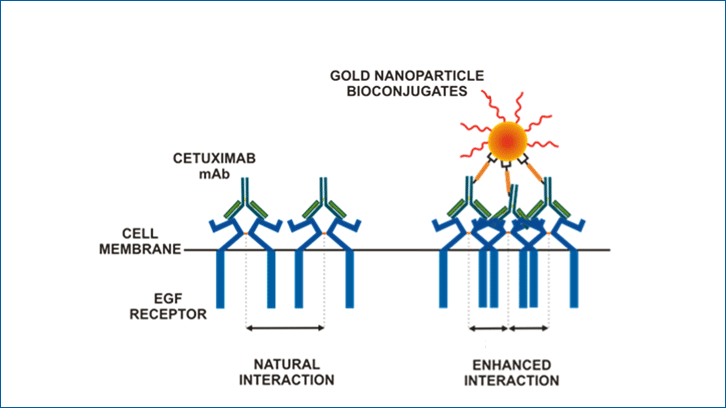Gold nanoparticles conjugated to Cetuximab antibody against cancer

A study led by Dr. Victor Puntes, a researcher at the Catalan Institute of Nanoscience and Nanotechnology (ICN2), and Dr. Julia Lorenzo, researcher at the Institute of Biotechnology and Biomedicine (IBB) and Biochemistry and Molecular Biology Department of the Autonomous University of Barcelona (UAB), has generated gold nanoparticles with the Cetuximab antibody, which is used in different antitumor therapies attached on their surface. The conjugation to gold nanoparticles would increase the effects of the therapy, since the nanoparticles would act to reduce the recycling of the receptor so that the therapeutic effects of the antibodies would increase and the necessary doses in immunotherapy would be reduced.
Normal cells require stimuli for their growth and maintenance. Normally, many of these stimuli are transmitted inside the cell through transmembrane receptors, one of which is the receptor of the epidermal growth factor or EGFR. Unlike normal cells, many tumor cells to grow faster overexpress these receptors and that is why they become good targets for the treatment of cancer. In fact, we found EGFR highly expressed in tumors of colon, bladder, pancreas, kidney, lung, head and neck, ovary or prostate among others. Overexpression is also associated with worse prognosis, therefore monoclonal antibodies such as Cetuximab have been developed. Cetuximab binds to the EGFR receptor by blocking the binding of its ligands and consequently its activation that prevents tumor cell growth. Although, many times the dosages required to achieve these results cause undesired side effects to patients.
Nanomedicine is the application of nanotechnology in the field of health sciences. The use of nanomaterials offers several advantages, among them the ability to transport molecules with therapeutic activity. In our case, we have used the surface of the gold nanoparticles to anchor the antitumor drug Cetuximab. In this work, we have demonstrated that if we control the orientation and the number of antibodies we anchor to the nanoparticles, we are able to generate a more effective nanomedicine. Thus, Cetuximab blocking effects were increased, and sustained for a longer time, when associated to the nanoparticles. Enhancing antibody therapy effects by decreasing the needed dose to prolong this action for a longer period of time may serve to decrease the necessary doses of this drug and therefore reduce the side effects in patients.
Julia.lorenzo@uab.es
Institut de BiotecnologIa i Biomedicina (IBB)
Universitat Autònoma de Barcelona
Victor Puntes
victor.puntes@icn2.cat
Institut Català de Nanotecnologia (ICN2)
Universitat Autònoma de Barcelona
References
García-Fernández L, Garcia-Pardo J, Tort O, Prior I, Brust M, Casals E, Lorenzo J, Puntes VF. Conserved effects and altered trafficking of Cetuximab antibodies conjugated to gold nanoparticles with precise control of their number and orientation. Nanoscale. Journal Nanoscale (9), (18); pp: 6111-6121; 11 May 2017; DOI: 10.1039/c7nr00947j

